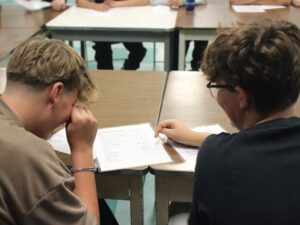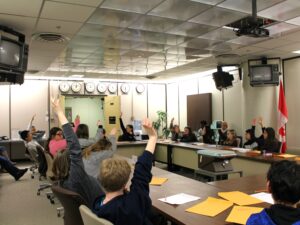
Conflict Resolution
Educational program description
Using the Cold War as a backdrop, this program teaches students the importance of conflict resolution and how to be responsible, active citizens. Students will learn principles for conflict resolution through different activities and will reflect on conflict in their lives. They will then get to apply this learning through resolving an international crisis as members of the government’s War Cabinet.
Includes an informative tour component and an interactive activity with discussion.


Grade Level:
> Ontario - Grade 7–10
> Quebec - Secondary I–IV
Format:
> On-Site
Duration:
> 4 hours (includes tour and lunch)
Cost:
> Starting at $18.00 per student
Language:
> English
> French (available by request)
Book your program
Review details on scheduling, pricing, and other logistics before you book.
Learning goals and curriculum connections
This program is great for social studies, history, geography, politics, health, science, and language classes. Students especially learn the four elements of the citizenship education framework.
Some skills students will learn in this program are communication, problem-solving, listening, collaboration, self-regulation, and critical thinking.
Grade 7–8 History/Geography: Through the four principles of conflict resolution, students will learn how to be responsible, active citizens and will practice these principles through a scenario where they act as the War Cabinet.
- Strand: Citizenship Education
- Grade 7 - Strand A: Physical Patterns in a Changing World
- Grade 8 - Strand A: Global Settlement, Patterns, and Sustainability
Grade 7–8 Language (English or French): Learn how to be an active listener during a conflict and express opinions in ways that are respectful for others, then practice this through engaging in a debate pretending to be the war cabinet.
- Strand: Oral and Non-Verbal Communication
Grade 7–8 Health: Learn different social-emotional learning skills that can use when resolving conflict helping students manage their emotions, create healthy relationships and self-awareness, and participate in critical thinking.
- Strand A: Social-Emotional Learning Skills
Grade 7–8 Drama: Learn about dealing with conflict when working in a group and then role play as government ministers in the war cabinet, using a real scenario from when this was used as a military base.
- Strand: Creating and Presenting
Grade 7–8 Science and Technology: Explore how humans interact in different systems and how science and technology overlaps with human society, while proposing solutions to different conflicts.
- Fundamental Concept: Systems and Interactions
Grade 9 Geography: Learn how to be responsible, active citizens and use this learning to respond as the war cabinet to nuclear war affecting our environment.
- Strand: Citizenship Education
Grade 10 History: Learn about Canada's response to the Cold War while also learning how to respond to conflicts like the Cold War as a responsible citizen, using a historical training scenario.
- Strand: Citizenship Education
- Strand D: Canada, 1945–1982
- Strand E: Canada, 1982 to the Present
Grade 10 Civics: Learn the principles of conflict resolution and apply these while acting as the different government ministries responding to a potential Cold War conflict.
- Strand: Citizenship Education
- Strand B: Civic Awareness
Grade 9–10 Language (English or French): Learn how to be an active listener during a conflict and express opinions in ways that are respectful for others, then practice this through engaging in a debate pretending to be the war cabinet.
- Strand: Oral Communication
Grade 9–10 Health: Learn four different principles for conflict resolution that will help to improve students interpersonal skills and then apply these skills in a debate pretending to be government ministers in the war cabinet during the Cold War.
- Strand 1: Living Skills
Grade 9–10 Drama: Learn about dealing with conflict when working in a group and then role play as government ministers in the war cabinet, using a real scenario from when this was used as a military base.
- Strand A: Creating and Presenting
History and Citizenship Education (I–II): Examine the social phenomenon of the Cold War and learn about how to be an active citizen while resolving a potential conflict from this period.
- Competency 1: Examines social phenomena from a historical perspective
- Competency 2: Interprets social phenomena using the historical method
- Competency 3: Constructs his/her consciousness of citizenship through the study of history
Geography (I–II): Learn about how to best approach conflicts and issues, then propose solutions to a global issue used as a training scenario during the Cold War.
- Competency 1: Understands the organization of a territory
- Competency 2: Interprets a territorial issue
- Competency 3: Constructs his/her consciousness of global citizenship
Language English or French (I–IV): Learn how to be an active listener during a conflict and express opinions in ways that are respectful for others, then practice this through engaging in a debate pretending to be the war cabinet.
- English - Competency 1: Uses language/talk to communicate and to learn
- French - Compétence 3 : Communiquer oralement selon des modalités variées
Drama (I–IV): Learn about dealing with conflict during a unified performance and then students create their own dramatic work, role playing as government ministers in the war cabinet.
- Competency 1: Creates dramatic works
- Competency 2: Performs dramatic works
History of Quebec and Canada (III–IV): Using the Cold War as a backdrop, learn the four principles of conflict resolution and apply them while pretending to be the war cabinet making decisions in this time.
- Competency 1: Characterizes a period in the history of Quebec and Canada
- Competency 2: Interprets a social phenomenon
- Specific Periods:
- 1945–1980: The modernization of Quebec and the Quiet Revolution
- From 1980 to our times: Societal choices in contemporary Quebec
Grade 7 | Grade 8 | Grade 9 | Grade 10
Social Studies | History | Geography | Language | English | French | Science | Civics | Politics | Drama | Health
The Diefenbunker is one of the most unique educational sites in Canada, offering an experiential learning environment, 75 feet underground. Students can immerse themselves in the Cold War and experience Canadian history from a perspective unlike any other. Explore our themed programs with links to elementary and secondary school curriculum.
SIGN UP FOR EDUCATOR RESOURCES
Receive occasional updates to your inbox on educational programs, lesson plans, and more!
By adding your details to this form, you are agreeing to receive email communications from the Diefenbunker Museum. You may opt out or unsubscribe at any time through the links at the bottom of our emails, or by emailing us at marketing@diefenbunker.ca.
